Ready to learn more?
Get all the details straight to your inbox!
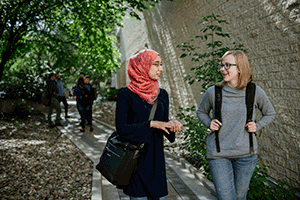
You can book a tour of Luther College, the U of R campus, and our student residence, The Student Village at Luther College, any time throughout the year. Contact our Recruitment Office at 1-306-206-2117.
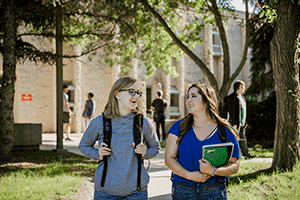
Luther College is a great choice for high school to university transition. Enjoy all the benefits of a larger campus, without feeling lost in the crowd. Our community is full of caring mentors and peers to ensure a positive student experience.

Smaller class sizes at Luther College means more individualized attention and better connections with your professors, classmates, and academic advisors.
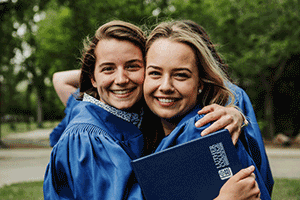
Luther students can register in Arts, Science, or Media, Art, and Performance. Luther students are U of R students and receive a U of R degree.
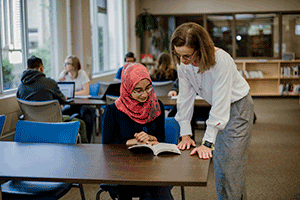
Luther College is recognized for its high standards of teaching, focused research, and one-on-one academic advising. We value and protect this heritage of excellence in scholarship, freedom of inquiry, and faithful seeking after truth.
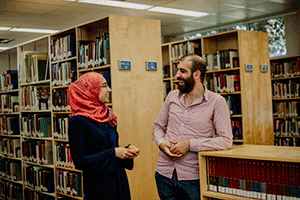
The Luther Library has over 24,000 items in its collection, 5,000 books checked out per year, and 7,000 students who come through its door per month.
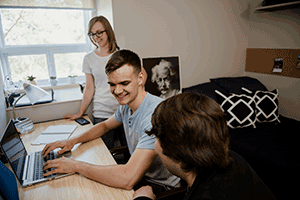
Wondering where to live? Our student residence, The Student Village at Luther College, is considered a great choice for first-year student accommodation. Individual private rooms mean you can stick to your own schedule and you never have to deal with roommate hassles.
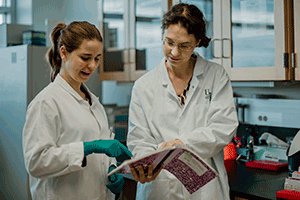
Luther College offers Bundles programs that group together first-year students and classes to give you a great start and help ease the transition from high school to university.
Get all the details straight to your inbox!
By Shirin Ganji, Canada
This poem serves as a requiem of the fond memories and new friendships formed at NAIN 2015. Thank you for making this a wonderful and fulfilling experience. SG.
Ode to Saskatchewan
“Swiftly flowing river” where the sound of crickets alarm the night
And the wildlife arise from the wilderness to bedazzle our sight,
The clear skies and the beautiful breeze awaiting a strangers meeting
Almost blessing you with its gentle kisses as to warm you and say its greeting
For the river moves swiftly, yet it is both tender and graceful
I could not have asked for a better moment, it was just so peaceful
Being surrounded by amazing people within a short timeline
Who will discuss their dreams and hopes and aspirations
Bonding over unity, interfaith and positive temptation
Their souls were filled with nectar so sweet and aromatic
So contagious and beautiful, I am not trying to be dramatic
I yearned for a longer adventure, a chance to learn, be objective
All good things come to end; it was time for an exit
And when it was time to say goodbye, the water stopped flowing
Not even time would freeze for me, but it would just keep on going
Off on our separate journeys, boarding our planes, so far away
We each are making a difference in our own unique way.
Reflection
"For the mystery of human existence lies not in just staying alive, but in finding something to live for. Without a concrete idea of what he is living for, man would refuse to live, would rather exterminate himself than remain on earth, even though everywhere around him was bread." (“The Grand Inquisitor" in Fyodor Dostoyevsky's The Brothers Karamazov, 1879–1880).
A while back, a friend of mine posted this quotation on Facebook. Immediately after stumbling upon it, I thought it to be brilliant because it emphasizes the importance of living a meaningful life, and although exterminating oneself is a bit extreme, the aim of the post was to metaphorically portray how having nothing to live for is equivalent to death. I would even go a bit further and say that having no one – or living a life of isolation – is equally as devastating.
Before my trip to Saskatchewan, I was quite perplexed and uncertain of the path I was about to embark on. I was on a journey for truth and desperately desiring to strengthen my own knowledge. Veritas vos liberabit, translated from its Latin origins as “the truth will set you free,” was my opening statement for my NAIN essay, and it was a testament to my desire to learn and develop as a person. Wisdom is the fruit of every tree, and with its nourishment we are able to grow, and so I wanted to continuously shape my world view and ignite my passions further. I rattled my brain over and over again on the philosophy of interfaith, seeking to synchronize with its goals and ideologies. I have engaged in interfaith work for many years, and yet I always felt something was missing – like there was a body but no heart, and for years I thought maybe, just maybe, we eagerly want this to work that we have conditioned ourselves into believing interfaith gatherings have brought us the results we so desired. I loved engaging and facilitating dialogue, but at times, I could not fathom what felt distant about the communication between faiths. It occurred to me that there are those who advocate for interfaith, and there are those who simply engage in it with no sole desire to make amends. Interfaith works when we are not only ready to listen, but strongly believe in it as an important act of survival. Maria Campbell, the author of the book Halfbreed, discusses the importance of unity in her book. She states: “I believe that one day, very soon, people will set aside their differences and come together as one. Maybe not because we love one another but because we need each other to survive. Then, together, we will fight our common enemies.”
In strong agreement with Campbell, I believe that we must view interfaith not only as a means to coexistence, but that it is serves a purpose especially when wanting to live a meaningful life. There needs to be understanding among individuals, and although we may feel progress is stagnant at times and may lack spirit, we are reminded that spirit is simply something that can be restored. With positive companionship and a nourishing environment, our hearts can be overwhelmed with inspiration to do the right thing.
In Plato’s Republic, he stresses the importance of living a just life. Thus, what makes life worth living in both cases is to have a sense of purpose, and to live fairly and justly. This can mean different things to different people, but I strongly believe we can agree that treating each other with respect, compassion and dignity are components that make up a just individual. Indubitably, those who engage in interfaith dialogue realize the importance of these values practised within their own tradition, and a vision of how the world ought to be. At the conference, we engaged and exchanged stories some of tears and tragedy, and others of humour. Bounded by the ideals to reconcile and educate each other, we were able to remind ourselves of the “proper protocol” when interacting and embracing diversity.
There needs to be a certain degree of integrity involved when we are willing to listen, and this is something this conference has come to teach us all. The idea of “Sacred Listening”, for example, comes in many forms. Listening is about being fully present, not only about being attentive, but also trying to empathize with the individual you are engaging with, hearing the sounds and embracing the silence, the laughter, the tears, the movement, and the body language. It is in this way that we can truly come to understand that beliefs and traditions manifest in multiple forms of expression. The way different cultures articulate and exhibit their beliefs are unique to the community and their heritage. An example of this was presented at First Nations University, when the drum had to be warmed before being played. When the drumming began, the sound emanating from it was none like I had ever heard before. It had its own distinctive rhythm, but its importance to the First Nations people is not merely just music for entertainment purposes. It also acts as a unifying force with its own deeply rooted traditional significance.
At the NAIN Connect Conference I had the honour of meeting talented young scholars, professionals, and religious leaders from a wide array of backgrounds. I was privileged with the opportunity to listen to the mere wisdom they had to share; it was an experience that was enlightening both on an emotional and spiritual level. Learning about other people’s beliefs not only provides us with an abundance of knowledge, but also serves as an important tool for self-discovery. It can either strengthen beliefs or challenge them, and also provides much-needed insight into ideas and concepts one has never thought about before.
For me, the highlight of the conference was the friendships I formed. I really enjoyed our one-on-one dialogues as well as the group conversations, both with my friends and with others who were part of the conference. This was the chance to genuinely get to know people, and also to connect with them on a personal level. In addition, having the young scholars spend a lot of time together was an excellent way to foster a strong sense of community. We were able to integrate together as a family, learn of each other’s habits, skills, beliefs, and identities. It was the perfect occasion to stay up late for reasons other than school or work, and just chat about issues that mattered significantly to each of us. We had the chance to share some laughs and stimulate the mind with word and picture games, and even play some music. For six days I had a new family, two great dorm buddies who made my mornings and night worth getting up for, as well as an amazing host who provided us with unforgettable hospitality. Each morning we were dropped off at the conference, and I would look forward to meeting the young scholars and listen to their stories and what inspired them into interfaith work. I also really enjoyed the youth bonding sessions, such as the youth gala, and the Middle Eastern Bazaar where I got to learn how to play the Middle Eastern drum known as the Darabukka.
Sometimes, it is the little things in life that matter the most. For me, sitting in the company of others and dining together really fostered an amazing sense of community and belonging among us. Not to mention, it made eating ever more tasteful. The space was incredibly comfortable and welcoming. This trip to Saskatchewan was an opportunity to put our own lifestyles behind us, and just share a moment with new strangers. As my billet host put it beautifully, “strangers are just friends you haven’t met yet.” I can truly say that these ambitious individuals are more than just friends – they are part of the interfaith family.
The range of diversity complimented the conference quite well. I remember at the open mic: we all gathered in a circle, and the Sikh music group suggested engaging in their traditional dance. It was a wonderful moment with everyone participating with an open mind, learning the dance, and joining in the centre for miniature solos. It was a great way to break the ice and get people involved – I would say that this was a more interactive way of sacred listening. The night continued with young scholars flooding the stage with their own unique talents. Will Dickerson did an interfaith singing circle where everyone had to listen attentively to the lyrics to follow along. It depicted musical unity and harmony and was a great way to bond. Karla Mendez and Elias Gonzalez shared a Spanish song with us offering a little taste of multiculturalism which really brightened the mood. It was quite a memorable moment. We all joined in at the chorus as our way of appreciating that piece. Elizabeth Veilleux choreographed a dance piece to Beyonce’s “Single Ladies” which was a ton of fun to learn and partake in. Grace Patterson read a lovely poetry piece she wrote, which was a personal reflection. To end the evening, Rachael Sumption sang Someone to Lava from the Disney movie Lava, which I might add was a beautiful performance and fitting for the conference theme. Some of us joined in to sing with her, just as friends do. And with that, a lovely evening came to an end. However, in that moment alone, each person got the opportunity to share a part of their identity, and have the audience participate which was very encouraging. All of us were active listeners, and we engaged enthusiastically with the show’s performances. This was one of my fondest memories.
There was a wide range of workshops and tours that we had the pleasure of attending. A notable workshop for me was the poetry slam workshop with Ahmad Masjid. It was a chance to express ourselves through poetry, which provided us with yet another way to listen. Poetry to me has always been something dear to my heart. It is a way for us to express ourselves by exposing a lot and very little at the same time. It can be difficult to have the courage to stand up and share with others but this poetry workshop not only provided a space to write creatively but provided us the comfort to showcase our pieces. I loved that everyone displayed a sense of humility; they were all worried that their poetry lacked skill even though some were phenomenal. Regardless, we were all encouraged to share, and were taught by Ahmad that “your work is unique to you”, and that each person has their own style to share. It definitely was an inspirational session that gave me the necessary confidence to continue writing, and even showcase my work in front of an audience. Evidently, that is what I did the next day for my “spirited moment”. I had shared a piece on women and the challenges they faced when integrating themselves into society. At first, I was uncertain of presenting my thoughts on the topic because it was a different perspective, but it was well worth it after it was done. This was a pivotal moment for me, and it also pushed me forward into a new direction I once had a fear of approaching.
The second workshop that I attended was “Acting and Listening”, which was led by Sean Rose, who was one of our youth scholars. It combined the use of improvisational activities with interfaith dialogue in an attempt to illustrate how acting can be used to share and convey certain concepts and concerns we may have while interacting with other faiths and cultures. When the improvisation began, we were asked to go around the classroom and pick a spot where we felt illustrated power. Seeing people being selective about their space and explaining their choices not only depicted a difference of opinion, but as the discussion continued, opinions began to change depending on how one was challenged with one’s notion of power. Power means different things to different people. These were the kind of activities that we were exposed to during this workshop; it was sacred listening through the arts – a means that combines body language, performance, and discourse.
Another moment that was heartbreaking but also educational was the tour to the residential school cemetery. It was devastating to see many of the children casted as a shadow only to be unknown to the visitors, but alive in the hearts of the aboriginals. We each had a chance to partake in greeting and sending prayers to the children. This was done by gently giving a small amount of tobacco to them along with a supplication. The pains were still visible as we learned about the history of that cemetery from our tour guide; however, one was also able to see the strength, the forgiveness, and most importantly, the hope that was present for a better future.
In conclusion, the conference taught me that we can strive to make a better world, or at least a world worth living in. There are so many beautiful people who practice the golden rule: in times of adversity we need to remind ourselves that negativity is only one side of the coin. There are many people all over the world who are the very embodiment of peace and justice. I had the privilege of meeting over one hundred people with such promising qualities. I learned that if we believe in something enough it can become intrinsic to our way of life, and that there is something real in wanting a community, acceptance, and happiness. At the end of the day, we want to be heard, we want someone to listen, and we want understanding. When we are deprived of any of these things, we have the tendency of falling short, especially when we feel neglected or judged.
I would like to end with something I wrote: “When clarity makes its presences apparent, it drops in like rain that washes the city, cleansing the hearts of sin and harvesting growth and a new beginning.” In other words, when something clicks, when something just make sense, it is a moment of clarity in our mind. It may change our perspective and guide us to new and exhilarating things. One spontaneous act of goodness can change the way we think about each other, and how we view the world around us. Whether or not we believe the same thing, we can agree that the good needs to be cultivated within our hearts by extension the heart of humanity.
After much contemplation and search, I would say my original path to find truth placed me exactly where I belong. Thank you, NAIN, for this wonderful opportunity!